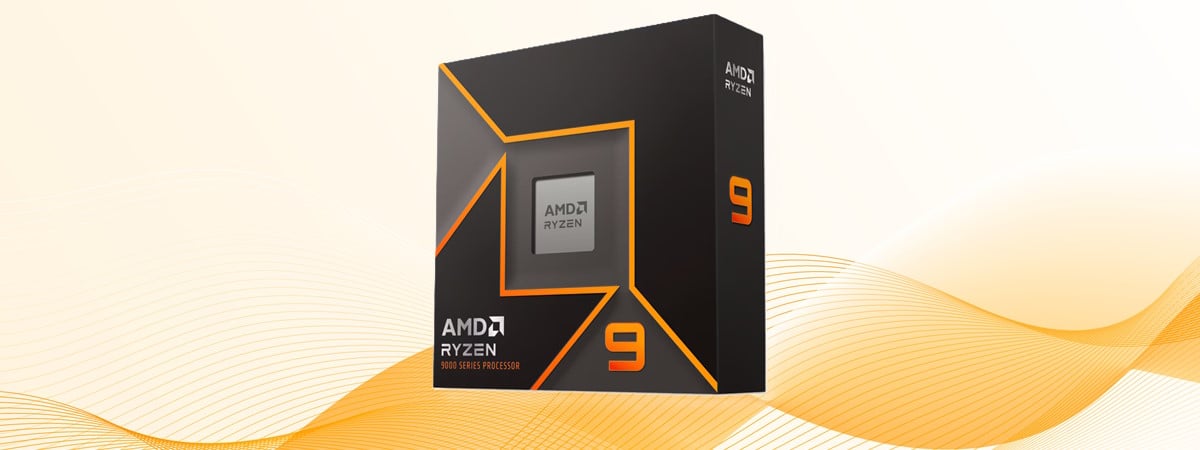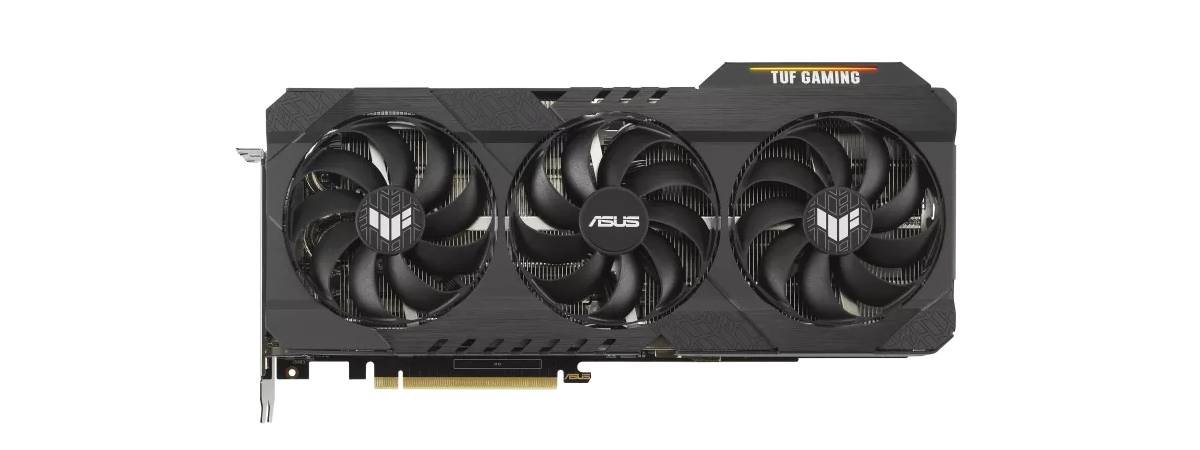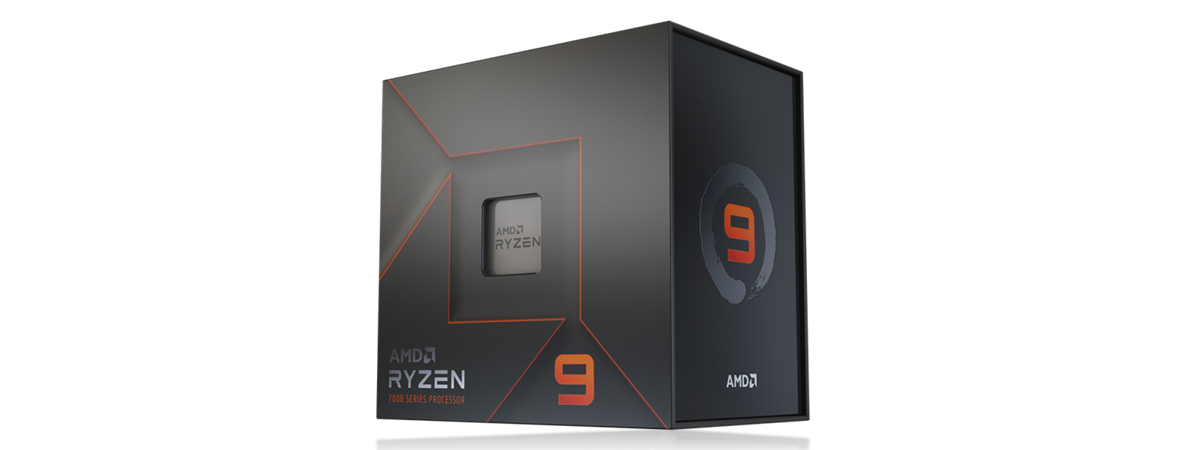
After teasing us with formidable specs and in-house benchmark results, AMD officially launched the Ryzen 7000 series of processors today. There are four new models out, ranging from enthusiast to high-end and mid-range, and the best of them is the AMD Ryzen 9 7950X. Featuring 16 cores and 32 threads and promising boost clocks of up to 5.7 GHz, the Ryzen 7950X looks like something out of a science-fiction tale. After all, did anyone expect to see such speeds a couple of years ago? Thanks to AMD, in 2022, we can experience these speeds as long as we have the required budget for an upgrade. If you want to know more about the AMD Ryzen 9 7950X, its many strengths, and few weaknesses, read this review:
AMD Ryzen 9 7950X: Who is it good for?
The AMD Ryzen 9 7950X is the best choice for:
- Digital content creators, PC gamers, IT Pros, and PC enthusiasts who desire unbeatable performance
- People with a generous budget, willing to upgrade to the new AM5 platform
Pros and cons
There are many good things to say about the AMD Ryzen 9 7950X:
- It’s the fastest desktop processor you can get today, unrivaled by anything else
- It packs 16 cores and has 32 threads, more than enough for any task, no matter how demanding
- Its boost frequency reaches 5.7 GHz and can go even higher
- It works with the ultra-fast PCI Express 5.0 and DDR5 memory
- Its power efficiency is great considering the amazing performance delivered
- Its recommended price is lower than that of the previous generation Ryzen 9 5950X
There are a few shortcomings as well:
- At launch, there are only premium AM5 motherboards available, which are quite expensive
- AMD Ryzen 7000 processors, including the Ryzen 9 7950X, are not compatible with DDR4, and the prices of DDR5 memory increase the final upgrade cost

Verdict
All competition is in AMD’s rearview mirror once again, with the AMD Ryzen 9 7950X leading the way. This processor is a marvel of technology and engineering. Not only does it come with a huge number of cores and threads, but it also runs at frequencies never before seen in consumer desktop processors: 5.7 GHz and beyond! Yes, you get that. Better power efficiency and significantly more performance compared to previous generations of AMD processors or the 12th Generation from Intel? Yes, you get that too. Support for new technologies like PCI Express 5 or DDR5? Yes again! Except for the premium price, what’s there not to like? The AMD Ryzen 9 7950X is a beast and the new uncontested king of desktop processors.
Unboxing the AMD Ryzen 9 7950X
The AMD Ryzen 9 7950X desktop processor arrives in a large box. Made from high-quality cardboard painted in gray and featuring orange accents, the packaging looks great. Oh, and you can see the processor through a cutout on the side.
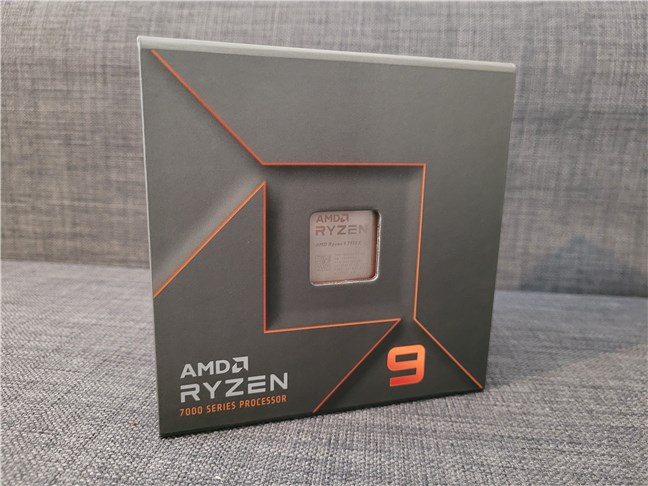
AMD Ryzen 9 7950X: the packaging looks great
Opening the package is an exciting experience. The thick cardboard box unravels to show you the contents: the processor, a small sticker, and the installation/warranty instructions, all sitting on top of a very large protective foam to keep the contents safe.
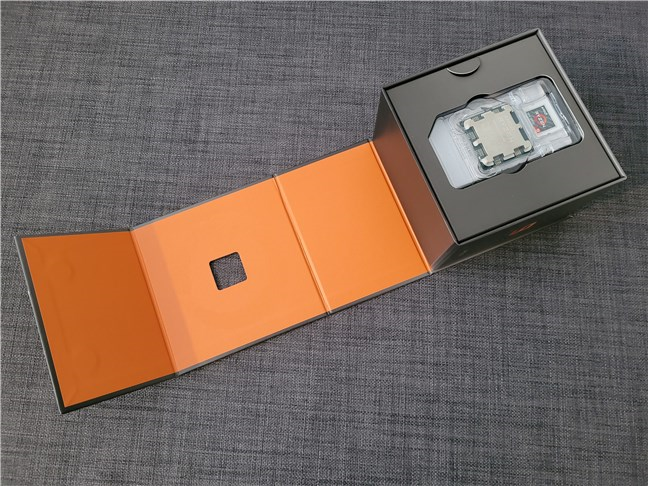
Opening the box of the AMD Ryzen 9 7950X
The processor looks like nothing I’ve seen before: while small and fairly thick, its heat spreader is definitely strange at first sight. But, regardless of what you may think about its looks, this design serves a higher purpose, allowing the cooler to apply more pressure on a smaller surface. Just pour a small dot (3 to 4mm in diameter) of thermal paste in the middle, and you’ll be all set.
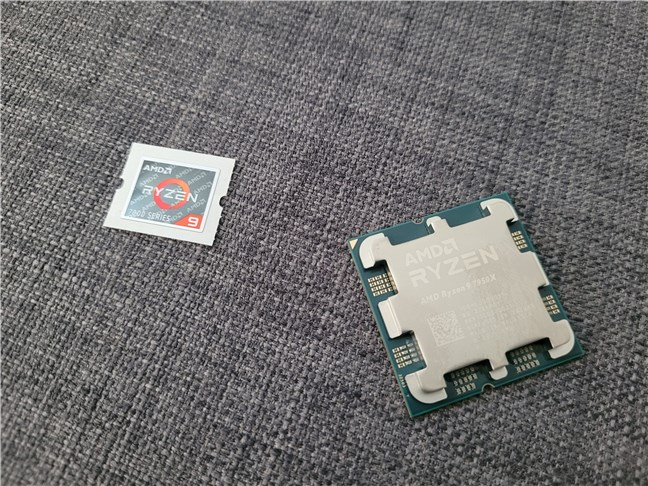
The AMD Ryzen 9 7950X processor
Unboxing the AMD Ryzen 9 7950X is an exciting experience worthy of a premium processor. While I didn’t expect such a large box for a processor without a bundled cooler, I must admit it looks great.
Hardware specifications
Not long ago, AMD unveiled the new Ryzen 7000 lineup based on the Zen 4 architecture, which, at launch, includes the Ryzen 9 7950X, Ryzen 9 7900X, Ryzen 7 7700X, and Ryzen 5 7600X. Out of the four, the Ryzen 9 7950X is the “king of the castle” processor that outmatches all the others, including Intel’s. According to AMD, the Zen 4-based processors come with an average IPC (instructions per clock) increase of about 13%, boost frequencies that easily go above the 5 GHz threshold, and up to 75% more power efficiency than their competition.
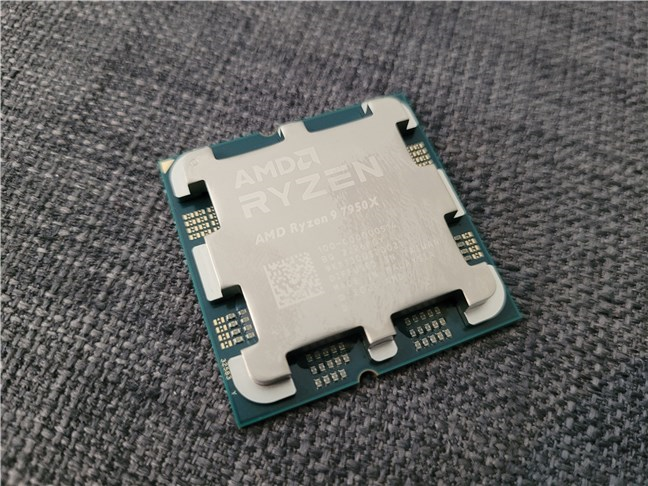
AMD Ryzen 9 7950X is small and fairly thick
Furthermore, the Zen 4 processors, including the AMD Ryzen 9 7950X that I’m reviewing today, will have better prices than their Zen 3 counterparts or Intel’s similar offers. The heavyweight Ryzen 9 7950X will be available for a recommended price of 699 USD, Ryzen 9 7900X for 549 USD, the high-end Ryzen 7 7700X for 399 USD, and the mid-range Ryzen 5 7600X for 299 USD. All four are available in retail stores starting September 27.
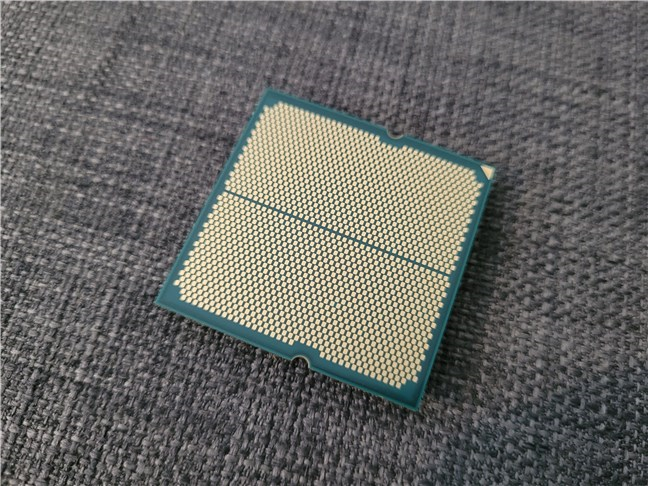
Gone are the pins. Now you have electrical contacts
Moving on to the subject of today’s review, the Ryzen 9 7950X comes with 16 cores and 32 threads running at a base clock of 4.5 GHz and a boost frequency of up to 5.7 GHz! The boost frequency is impressive and much higher than what its predecessors were able to sustain. And that’s not all: although the official maximum speed is 5.7 GHz, in my tests, I’ve found that the processor can go even higher. I’ve seen it boost at up to 5.75 GHz! Obviously, how fast it can run depends on how good the motherboard is and, probably even more important, on the efficiency of your cooling system.
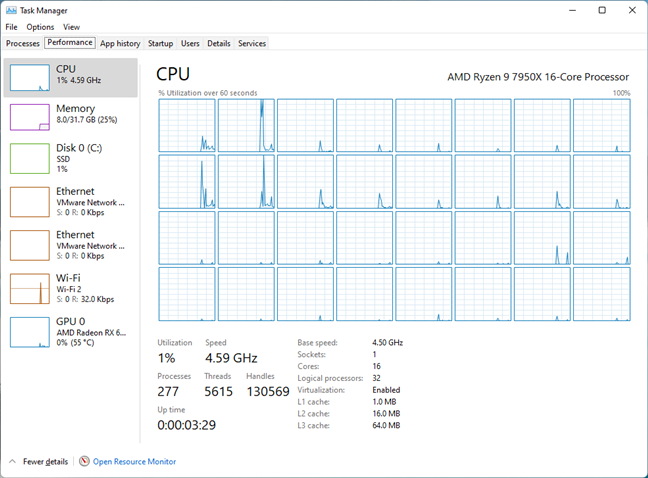
AMD Ryzen 9 7950X has 32 execution threads
The Ryzen 9 7950X is equipped with 64 MB of Level 3 cache, just like its forerunners, the AMD Ryzen 9 5950X and Ryzen 9 5900X. However, it gets double the Level 2 cache memory, which increases from 8 to 16 MB. Regarding RAM specs, the Zen 4 processors, including the Ryzen 9 7950X, work only with DDR5 running at a default speed of up to 5200 MT/s (megatransfers per second). However, AMD also introduced a new standard for built-in overclocking profiles for DDR5 memory, called EXPO (Extended Profiles for Overclocking). Using RAM memory that supports AMD EXPO allows you to easily overclock them and reach higher speeds. Apparently, the sweet spot for the processors in the Ryzen 7000 series is DDR5 running at 6000MT/s.
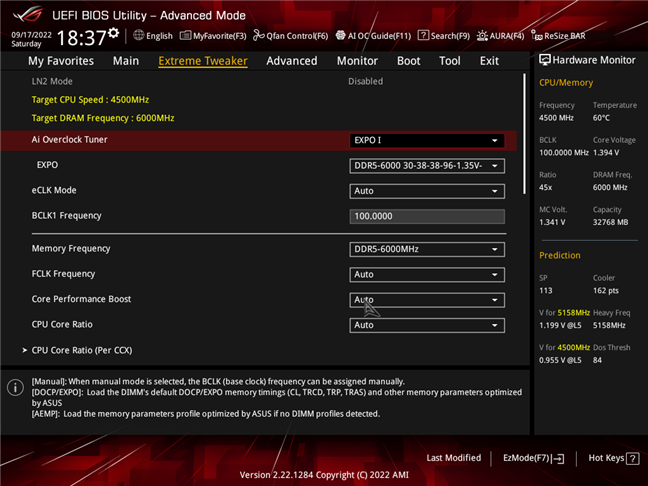
Ryzen 9 7950X supports AMD EXPO memory profiles
The AMD Ryzen 9 7950X has a high default TDP (Thermal Design Power) of 170 Watts. However, considering the core and thread numbers, as well as the base and boost clocks, the TDP doesn’t seem that big, especially compared to the competition. It’s also worth noting that AMD no longer bundles stock coolers with its processors, which may be a disappointment to some users.
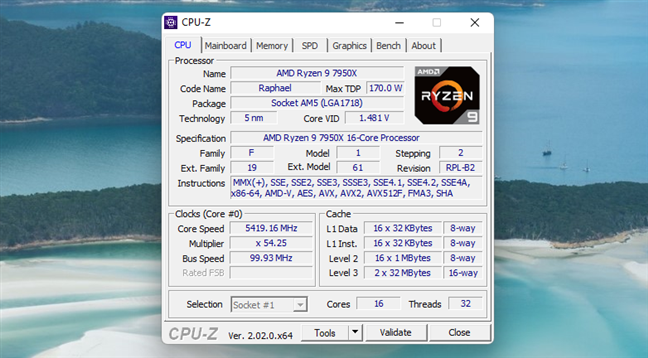
AMD Ryzen 9 7950X specs as shown by CPU-Z
This processor supports PCI Express 5.0 and works on the new AM5 socket, which is not compatible with the previous AMD processor series. Zen 4 CPUs are supported by motherboards that use a 600-series chipset. Motherboards using X670E, X670, and B650 chipsets should become available today, at the same time that the Ryzen 7000 processors are launched. However, B650E-based motherboards will come later this year.
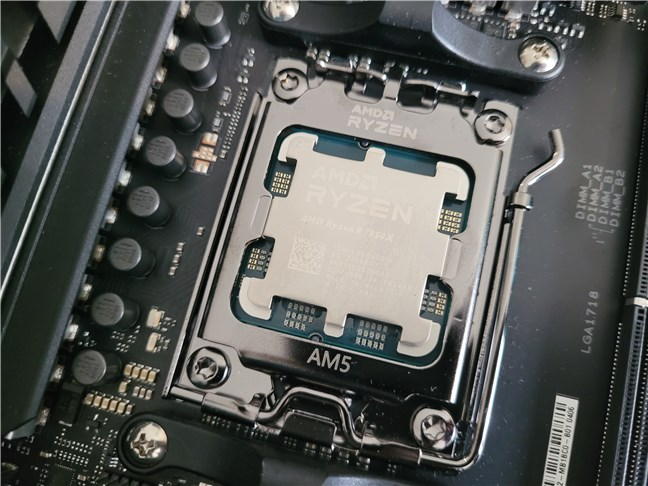
The AMD Ryzen 9 7950X installed on an X670E motherboard
Built on the AMD Zen 4 architecture, which promises at least a 13% increase in IPC (instructions per clock), the Ryzen 9 7950X is an incredible desktop processor. Going way over the 5 GHz threshold and reaching at least 5.7 GHz while boosting, it should be capable of offering fantastic single-core performance! That’s great for gaming, and it’s not the only impressive thing about it: packing 16 cores and 32 threads, this processor looks like it’s an absolute beast in terms of performance offered in digital content creation software.
Performance in benchmarks and games
I tested the AMD Ryzen 9 7950X processor on a PC with the following hardware and software:
- Motherboard: ASUS ROG Crosshair X670E Hero
- CPU cooler: Cooler Master MasterLiquid ML360R RGB
- Memory: G.Skill Trident Z5 Neo DDR5 Memory (2 x 16 GB, 6000 MT/s)
- Graphics Card: AMD Radeon RX 6800 (16 GB)
- Storage: Kingston KC3000 NVMe PCIe 4.0 SSD (2 GB)
- Monitor: ASUS ROG Strix XG32VQ Curved Gaming Monitor (1440p)
- Power Supply Unit: ASUS ROG Thor 850W Platinum
- Operating System: Windows 11 Pro version 21H2, build 22000.978
To get a clearer idea about the performance offered by the AMD Ryzen 9 7950X, I’ve put it side to side with the AMD Ryzen 7 7700X (Zen 4 architecture, 8 cores, 16 threads, up to 5.4 GHz) and the AMD Ryzen 9 5900X (Zen 3 architecture, 12 cores, 24 threads, up to 4.8 GHz).
I started by running CPU-Z to benchmark the processor's single-thread performance and got a huge score of no more, no less than 772 points, almost the same as the score I got on its smaller brother, the Ryzen 7 7700X. However, when compared to the Ryzen 9 5900X, that’s a performance increase of over 17%.
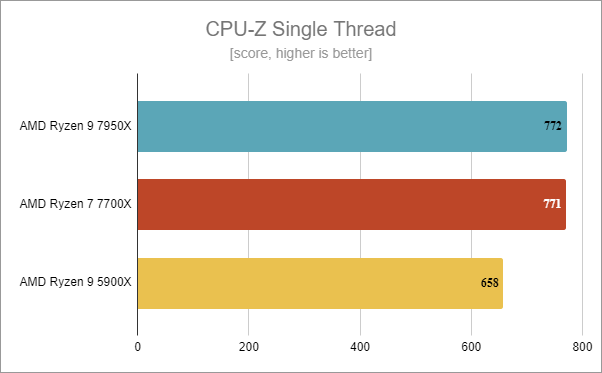
AMD Ryzen 9 7950X: CPU-Z Single Thread benchmark results
In CPU-Z's Multi-Thread benchmark, the Ryzen 9 7950X managed the highest score I’ve ever seen: 15536 points! To put things in perspective, that's a 66 percent increase from the Ryzen 9 5900X and a 35% increase compared to Intel’s best processor today, the Intel Core i9-12900K!
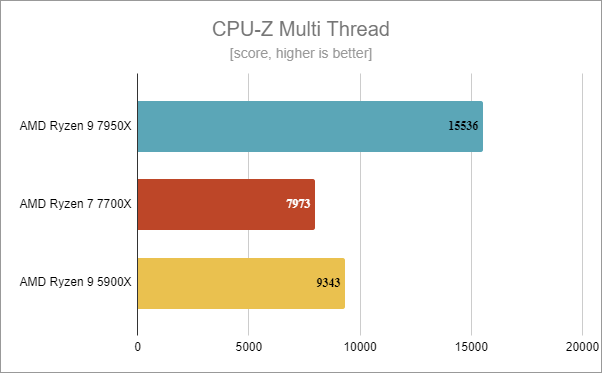
AMD Ryzen 9 7950X: CPU-Z Multi Thread benchmark results
Next, I moved on to the rendering benchmarks, where I was sure that the Ryzen 9 7950X, with its 16 cores and 32 threads, could easily amaze anyone. In Cinebench R23, I got 36509 points using all the processor cores. Wow, just wow! A 34% performance increase if I’m counting from an Intel Core i9-12900K and 76% more than I got with an AMD Ryzen 9 5900X.
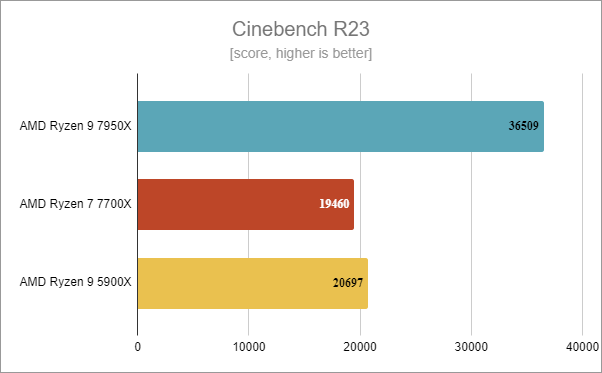
AMD Ryzen 9 7950X: Cinebench R23 benchmark results
In Blender, the AMD Ryzen 9 7950X continued to deliver incredible results. With 603 points, it practically axes the competition, offering a performance increase of almost 60% compared to the Intel Core i9-12900K! Oh, and almost two times faster than my old Ryzen 9 5900X. 🙂
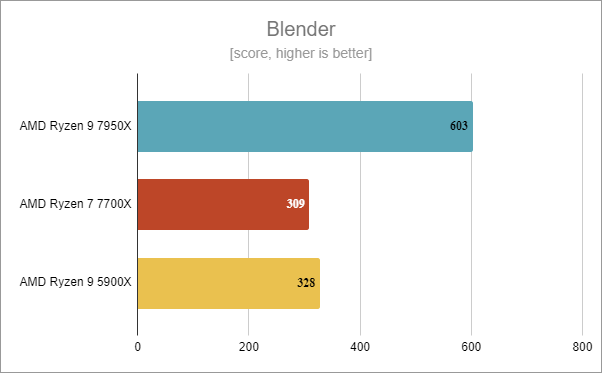
AMD Ryzen 9 7950X: Blender benchmark results
The next benchmark I ran was PCMark 10 to see how fast and powerful the desktop PC on which I had the Ryzen 9 7950X is in regular activities like browsing the web, participating in video conferences, working with Office apps, and creating digital content. Unfortunately, the benchmark failed to run when I used the smaller brother of the family, the Ryzen 7 7700X, probably having something to do with drivers. However, with the Ryzen 9 7950X, I got a score of 9828 points which, according to the benchmark creators, makes this computer better than 99% of all PCs and laptops in the world!
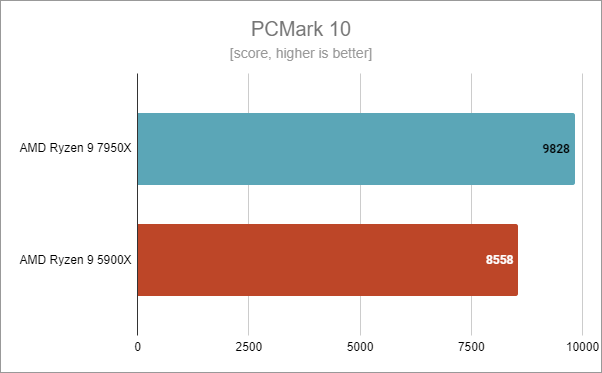
AMD Ryzen 9 7950X: PCMark 10 benchmark results
Browsing the internet is probably the one thing that we all do on our computers, regardless of our occupation or hobbies. That's why I also run the JetStream 2 browsing benchmark in Google Chrome. A higher score means a faster processor and a better web browsing experience. The Ryzen 9 7950X managed 326 points, which counts as a performance increase of over 31% from a Ryzen 5900X. Interestingly, the score I got with the Ryzen 7 7700X was actually a bit higher.
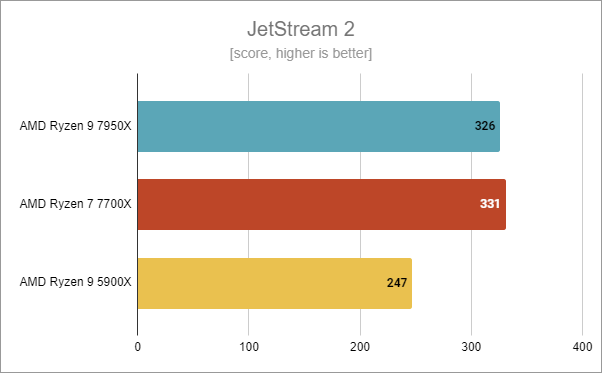
AMD Ryzen 9 7950X: JetStream 2 benchmark results
7-Zip, a file compression app, is useful if you want to get a clearer picture of how fast a processor is. AMD Ryzen 9 7950X managed a compression rate of 156 MB/s, which is exactly double the speed of my Ryzen 9 5900X! I’ll say it again: wow!
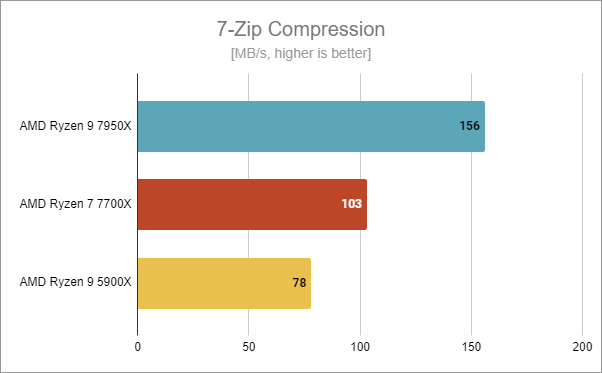
AMD Ryzen 9 7950X benchmark results: 7-Zip Compression
The decompression speed in 7-Zip was just as impressive: 2962 MB/s! A 56% increase from a Ryzen 9 5900X.
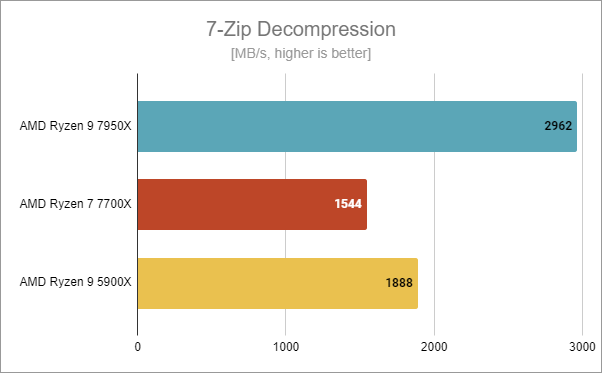
AMD Ryzen 9 7950X benchmark results: 7-Zip Decompression
3DMark also has a benchmark designed to measure the gaming performance of processors. It’s called CPU Profile and can evaluate the processor’s speed when running games using all the CPU threads or only some of them. Most AAA games today know how to use multiple cores, so I believe the best comparison between processors is based on the all-threads scores. The AMD Ryzen 9 7950X achieved 16287 points, which translates into a 58% performance increase compared to an AMD Ryzen 9 5900X, and a 39% increase from an Intel Core i9-12900K!
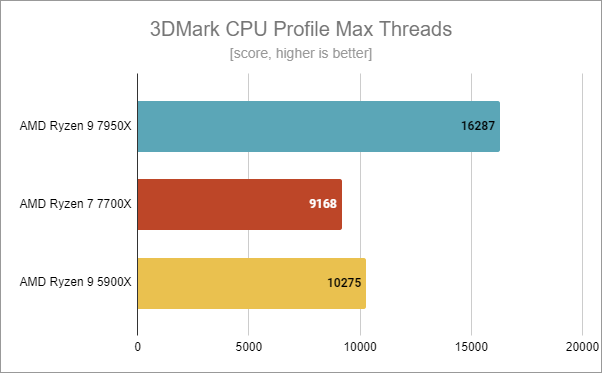
AMD Ryzen 9 7950X benchmark results in 3DMark CPU Profile Max Threads
Next, I checked how the AMD Ryzen 9 7950X fares in gaming, where it should prove to be one, if not the best gaming processor available today. In an attempt to avoid GPU bottlenecks from the AMD Radeon RX 6800 video card I had, I ran the games in 1080p resolution and using the lowest graphics quality settings.
In Shadow of the Tomb Raider, using the AMD Ryzen 9 7950X, I measured a framerate of 336 fps. That’s 26% more frames per second than I got with the Ryzen 9 5900X.
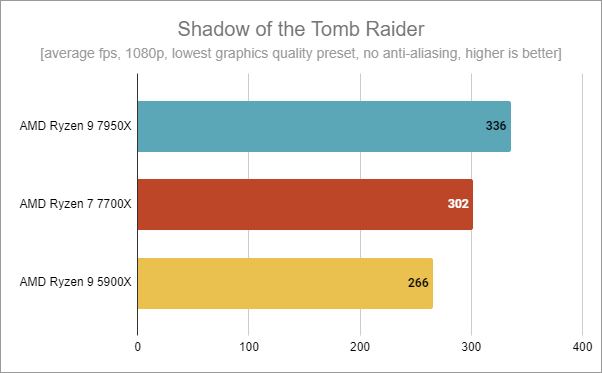
AMD Ryzen 9 7950X - Gaming in Shadow of the Tomb Raider
In Metro Exodus, a very demanding game, I measured 317 frames per second. While that’s an 18% increase from a Ryzen 9 5900X, the Ryzen 7 7700X actually did better. The latter was faster by 3.47%.
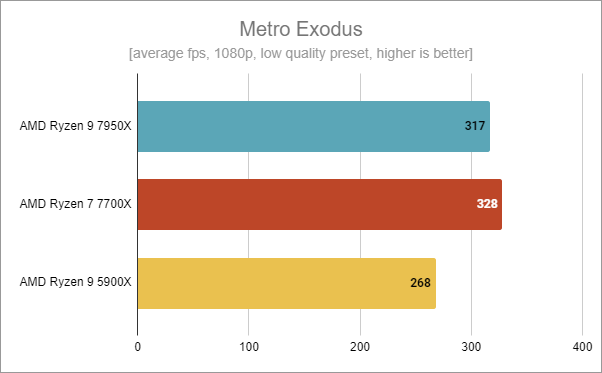
AMD Ryzen 9 7950X - Gaming in Metro Exodus
In Cyberpunk 2077, I got similar framerates, above 180 fps, with all the three processors I had, although both the Ryzen 9 7950X and the Ryzen 7 7700X were a tad faster than the older Ryzen 9 5900X.
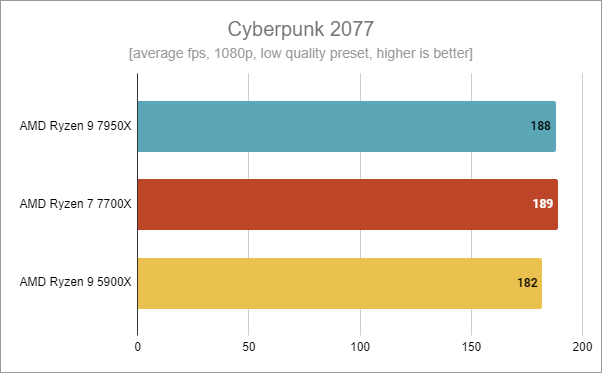
AMD Ryzen 9 7950X - Gaming in Cyberpunk 2077
Last but not least, Assassin's Creed Valhalla, a game that’s extremely demanding both in terms of processor power and graphics performance. All three processors included in my tests managed the same result: 205 fps. I suspect that my Radeon RX 6800 GPU managed to become a bottleneck here…
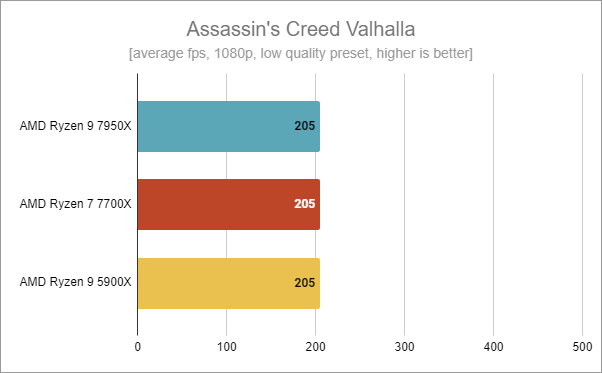
AMD Ryzen 9 7950X - Gaming in Assassin's Creed Valhalla
During benchmarks, I also kept an eye on the temperatures reached by the AMD Ryzen 9 7950X. The maximum temperature I witnessed was 98 degrees Celsius (208 Fahrenheit). It's a relatively high temperature, but I can live with that for the sheer amount of performance offered by this processor. 🙂
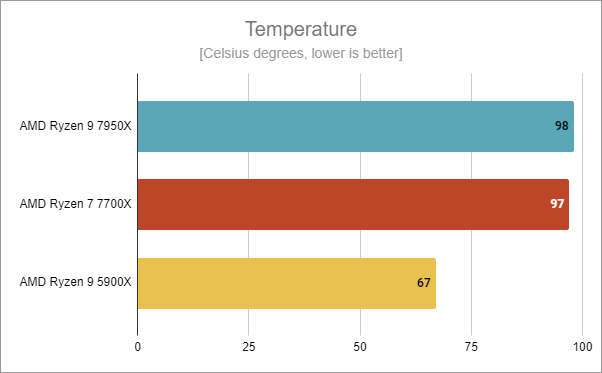
Running temperatures for AMD Ryzen 9 7950X
The same goes for the power consumption: the AMD Ryzen 9 7950X needs quite a significant amount of electrical energy when running full-throttle. I saw it draw as much as 195 Watts, which is a lot in abstract terms, but not so much if you take into account the amount of performance delivered by it. Even more so, if you look at its direct competitor right now: the Intel Core i9-12900K can draw 210 Watts on its own and doesn’t even come close to the performance offered by the Ryzen 9 7950X.
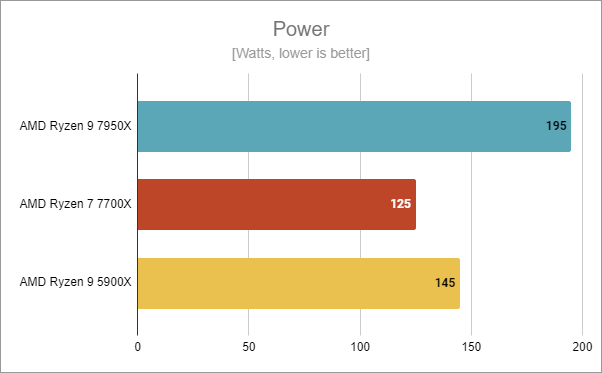
AMD Ryzen 9 7950X power consumption
The AMD Ryzen 9 7950X proved to be extremely fast in all the benchmarks I ran. It actually made me say “wow” repeatedly, sometimes out loud. 🙂 The large number of cores and threads paired with the incredible 5.70 GHz boost speed attainable by the Ryzen 9 7950X make it a powerhouse, no matter how you look at it. For gaming, it offers incredible performance, and when it comes to content creation workloads (think about video rendering jobs), it’s impossible to beat. As it is right now, Intel 12th Gen processors don’t have a fighting chance against the AMD Ryzen 9 7950X.
What's your opinion about the AMD Ryzen 9 7950X?
Now you know just how impressive the AMD Ryzen 9 7950X is not just on paper but also in real life. There’s nothing compared to it on the market right now, and that says a lot about AMD and its technological advances. What do you think? Are you as hyped as my colleagues and I about the new AMD Ryzen 9 7950X? Let us know in the comments section below.


 26.09.2022
26.09.2022 
